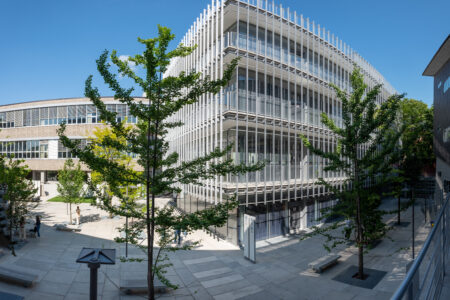Cristiano Ronaldo, LeBron James, Serena Williams, Simone Biles – these are some of the world’s top athletes who have dominated the game with their skills, sportsmanship, and power. But behind every world champion is a sports engineer who is constantly designing, developing, and improving equipment, technology, and other items that allow a sportsperson to perform at their highest peak.
This is what Politecnico di Milano excels in. Its Sports Engineering specialisation track under the Mechanical Engineering programme is at the forefront of sports and technology research. Ranked #9 in Mechanical Engineering and ranked #23 in the world for its advancements in the engineering and technology field, it offers an engineering specialisation that meets the demand for high-performance equipment, the increasing interest in sports science, and the economic growth of the sector that is in need for a new class of expert technicians.
The course strikes an effective balance between theory and experiential learning. Here, you will complete six core courses that give you a fundamental understanding of the principles, concepts, and mathematical models of sports engineering. Then, you’ll choose one of five track-specific courses that align with your interests in the field.
Rigorous lectures, assignments, and problem-solving exercises in classrooms, as well as hands-on learning and experimentation, feature largely in both core courses and electives. This approach ensures you have the foundational knowledge base and practical know-how to handle tools and equipment as well as enhance your problem-solving and critical-thinking abilities. You will also get the chance to design and test prototypes like robotic devices and virtual/augmented reality that could benefit the industry.
Take its ActivE³ project, for example, an initiative to fuse sports, technology, and rehabilitation in its research and develop solutions that include inclusivity in sports. It is focused on enabling people with motor disabilities to engage in outdoor activities, such as its development of the hybrid trike. This three-wheel recumbent bicycle operates using sensor pedals, electric motors, and a Functional Electrical Stimulation system for stimulating muscle groups in the lower limbs.

Politecnico di Milano’s Sports Engineering specialisation track, under the Mechanical Engineering programme, embeds the latest in sports and technology research. Source: Politecnico di Milano
“We discover how sports become not only a form of physical well-being but also a powerful tool for inclusion, capable of providing people with different degrees of disability increasing autonomy,” Professor Emilia Ambrosini says. “With the help of students, we developed an electric muscle stimulator capable of sending trains of coordinated stimulations that include the contraction of paralysed muscles and the reproduction of the movement of pedalling in people with complete paralysis of the lower limbs.”
At Italy’s largest science-technology university, pioneering projects aren’t reserved for researchers only, but often a collaboration between students and faculty. “Back in 2019, I put together a team of mainly students and PhD Candidates in Biomedical Engineering and Mechanical Engineering,” Ambrosini says. “In the [Cybathlon] competition just gone, we came third place (out of 10 teams), with rider Andrea Gatti.”
Because of the practical nature of the Sports Engineering track, most of your work will take place in laboratories. The interdepartmental E⁴SPORT has six departments working together to serve athletes and people with disabilities. With projects like Safer Helmets and the Mondotrack™ Ellipse Impulse, it is evident that research at E⁴SPORT is crucial to the industry.
Another main research facility is the Human Performance Lab, which deals more with the functional evaluation of sportspersons and their different body conditions. Biomechanics and human movement, injury prevention, disturbances in human balance and locomotion, and athletic and motor-cognitive performances are the research topics often covered in this laboratory.

Lecco Campus is an excellent launch pad for a variety of outdoor activities. Source: Politecnico di Milano
Collaborations are a regular occurrence at the Human Performance Lab too. The lab works with other universities and various sports entities, such as clubs and federations, to organise testing and assessment sessions with real athletes.
“I have found that sports engineering labs in Lecco [Campus] are some of the most important assets of my education,” student Ian Van Ham from the US says. “The sports engineering labs are where theory and real-world problem-solving collide and allow me to experiment and grow my knowledge of the material.”
Van Ham chose Politecnico di Milano as it was one of the few universities offering a master’s degree in Sports Engineering – a programme that would fuse his training in mechanical engineering with his creativity and love for sports. Being based in the Lecco Campus was a bonus. He describes it as “an excellent launch pad for a variety of outdoor activities including rock climbing, hiking, skiing, sailing and scuba diving.”

Thirty scholarships worth US$5,200 (approximately 5,000 euros) each will be awarded to students who are exceptional in competitive sports as well as their studies. Source: Politecnico di Milano
Sports scholarships for outstanding students
To promote the value of sports and encourage more people to stay active, the university has established a scholarship for students who stand out in both sports and their studies. Thirty scholarships worth US$5,200 each will be awarded to students excel academically and are exceptional in a competitive sport recognised by the Italian National Olympic Committee or the International Olympic Committee.
These scholarships for sports merit are not only motivation for you to achieve education excellence but also to encourage sports as an added value in your learning process. Sports teach you inclusion, health, equal opportunities, and fair play – all of which come together to make the world a better place.
Follow Politecnico di Milano on Facebook, Instagram, LinkedIn, X, and YouTube.












